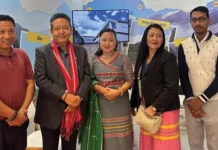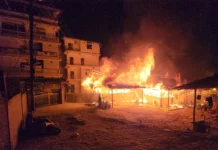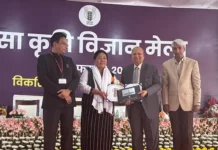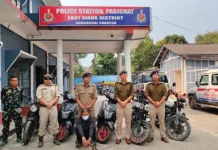HAWAI, 8 Oct: The KVK, Anjaw organized a training programme on scientific cultivation of oilseed at Kamlat here on Wednesday.
The programme aimed to empower farmers with improved cultivation techniques of oilseed and seed distribution under the CFLD oilseeds initiative, thereby enhancing oilseed production, increasing farmers’ incomes, and contributing to regional edible oil self-sufficiency, according to a KVK release.
During the training, KVK expert Naveen Khoisnam highlighted best practices in soil preparation, sowing methods, seed varieties suitable for Anjaw district, nutrient management, and integrated pest and disease control specifically tailored for oilseed cultivation. A demonstration on seed treatment to protect against seed borne diseases was also conducted.
Informing the farmer that oilseed crops are moisture-sensitive at germination, flowering and pod filling stages, subject matter specialist Ugarsain Sangwan advised them to provide uniform moisture at germination, irrigate at critical stages-early vegetative, flowering, and pod filling-if rainfall is insufficient. He suggested avoiding frequent over-irrigation and water logging.
Toria TS-67 seeds were distributed to the farmers.
The farmers expressed appreciation for the hands-on experience and the access to quality seeds and agricultural inputs, which will support sustainable oilseed farming in their communities.
This initiative was part of ongoing efforts by KVK and partner organizations to boost oilseed productivity and promote sustainable farming systems.
Meanwhile, the KVK West Siang, in collaboration with the ArSRLM Daring unit organized a three-day training and technology demonstration programme at New Daring from 6 October.
The programme covered topics, including disease and pest management in rabi vegetable crops, year-round oyster mushroom cultivation, vermicompost production, scientific turmeric and ginger cultivation, organic farming, and good agricultural practices, according to a KVK release.
The training aimed to impart scientific knowledge on these subjects and was specifically designed to train the extension cadres of the ArSRLM Daring unit.
KVK head Manoj Kumar emphasized the importance of adopting organic farming practices to ensure healthy food production and to mitigate environmental degradation caused by excessive use of chemical pesticides.
Block coordinator for Livelihoods Non-Farm Mission, ArSRLM Daring unit, Kenbom Doke highlighted the significance of technological interventions for successful farming as well as mitigating both abiotic and biotic stress.
KVK scientist Kangabam Suraj S. provided comprehensive technical insights into disease and pest management through biocontrol methods, year-round oyster mushroom cultivation, and vermicompost production.
During the practical sessions, he demonstrated oyster mushroom cultivation and the installation of HDPE vermibeds. He also introduced the preparation of Natural Farming’s ‘ASTRA’ – a farmer-friendly formulation for disease and pest control that can be easily prepared at home.
The programme concluded with the distribution of rabi vegetable seeds to the participants.




